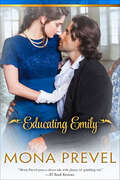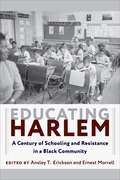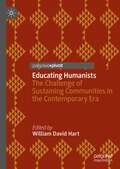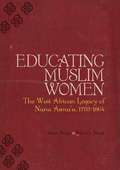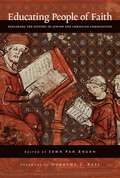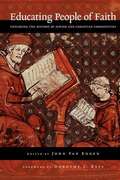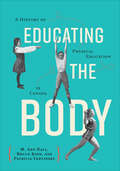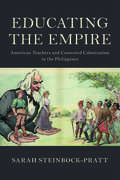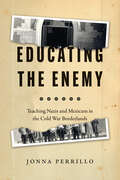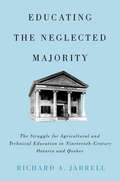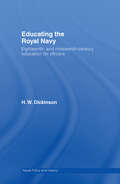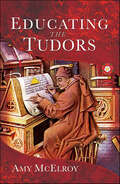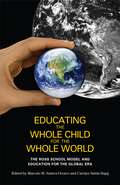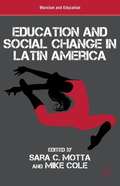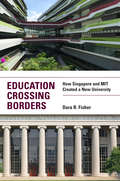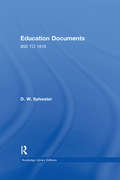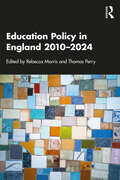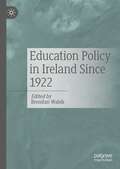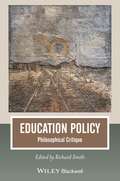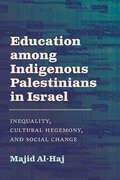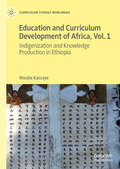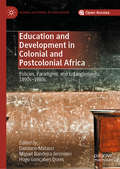- Table View
- List View
Educating Emily
by Mona PrevelHe taught her the ways of the world, and she taught him the ways of love.Fated to be sold into a loveless marriage, Emily Walsingham runs away. But when she is rescued by dashing James Garwood, she fall desperately in love. Recognized by James's mother, Emily is declared the perfect wife for him, despite the fact that he has yet to declare his love for her.When James Garwood agrees to marry Emily, he never expected to be any more than a tolerable companion. But as she proves to be more caring and intelligent than he imagined, a man thought to be incapable of true devotion will learn more than he bargained for about falling in love.
Educating Harlem: A Century of Schooling and Resistance in a Black Community
by Ernest Morrell Ansley T. EricksonOver the course of the twentieth century, education was a key site for envisioning opportunities for African Americans, but the very schools they attended sometimes acted as obstacles to black flourishing. Educating Harlem brings together a multidisciplinary group of scholars to provide a broad consideration of the history of schooling in perhaps the nation’s most iconic black community.The volume traces the varied ways that Harlem residents defined and pursued educational justice for their children and community despite consistent neglect and structural oppression. Contributors investigate the individuals, organizations, and initiatives that fostered educational visions, underscoring their breadth, variety, and persistence. Their essays span the century, from the Great Migration and the Harlem Renaissance through the 1970s fiscal crisis and up to the present. They tell the stories of Harlem residents from a wide variety of social positions and life experiences, from young children to expert researchers to neighborhood mothers and ambitious institution builders who imagined a dynamic array of possibilities from modest improvements to radical reshaping of their schools. Representing many disciplinary perspectives, the chapters examine a range of topics including architecture, literature, film, youth and adult organizing, employment, and city politics. Challenging the conventional rise-and-fall narratives found in many urban histories, the book tells a story of persistent struggle in each phase of the twentieth century. Educating Harlem paints a nuanced portrait of education in a storied community and brings much-needed historical context to one of the most embattled educational spaces today.
Educating Humanists: The Challenge of Sustaining Communities in the Contemporary Era (Studies in Humanism and Atheism)
by William David HartThis volume explores the challenges that humanists face from hostile religious traditionalists on its right flank and from the political antihumanism, which is often postsecular, of critics on its left flank. Given this dual challenge, how can "secular" humanism educate, sustain, and reproduce itself?
Educating Muslim Women
by Beverley Mack Jean BoydNana Asma'u was a devout, learned Muslim who was able to observe, record, interpret, and influence the major public events that happened around her.Daughters are still named after her, her poems still move people profoundly, and the memory of her remains a vital source of inspiration and hope. Her example as an educator is still followed: the system she set up in the first quarter of the nineteenth century, for the education of rural women, has not only survived in its homeland-through the traumas of the colonization of West Africa and the establishment of the modern state of Nigeria-but is also being revived and adapted elsewhere, notably among Muslim women in the United States.This book, richly illustrated with maps and photographs, recounts Asma'u's upbringing and critical junctures in her life from several sources, mostly unpublished: her own firsthand experiences presented in her writings, the accounts of contemporaries who witnessed her endeavors, and the memoirs of European travelers. For the account of her legacy the authors have depended on extensive field studies in Nigeria, and documents pertaining to the efforts of women in Nigeria and the United States, to develop a collective voice and establish their rights as women and Muslims in today's societies.Beverley Mack is an associate professor of African studies at the University of Kansas. She is co-editor (with Catherine Coles) of Hausa Women in the Twentieth Century and co-author (with Jean Boyd) of The Collected Works of Nana Asma'u, 1793-1864 and One Woman's Jihad: Nana Asma'u Scholar and Scribe.Jean Boyd is former principal research fellow of the Sokoto History Bureau and research associate of the School of Oriental and African Studies at the University of London. She is the author
Educating People of Faith: Exploring the History of Jewish and Christian Communities
by John H. Van EngenA much-needed addition to the emerging literature on the formative power of religious practices, Educating People of Faith creates a vivid portrait of the lived practices that shaped the faith of Jews and Christians in synagogues and churches from antiquity up to the seventeenth century.This significant book is the work of Jewish, Roman Catholic, Orthodox, and Protestant scholars who wished to discover and describe how Jews and Christians through history have been formed in religious ways of thinking and acting. Rather than focusing solely on either intellectual or social life, the authors all use the concept of "practices" as they attend to the embodied, contextual character of religious formation. Their studies of religious figures, community life, and traditional practices such as preaching, sacraments, and catechesis are colorful, detailed, and revealing. The authors are also careful to cover the nature of religious education across all social levels, from the textual formation of highly literate rabbis and monks engaged in Scripture study to the local formation of illiterate medieval Christians for whom the veneration of saints' shrines, street performances of religious dramas, and public preaching by wandering preachers were profoundly formative.Educating People of Faith will benefit scholars and teachers desiring a fuller perspective on how lived practices have historically formed people in religious faith. It will also be useful to practical theologians and pastors who wish to make the resources of the past available to practitioners in the present.
Educating People of Faith: Exploring the History of Jewish and Christian Communities
by John Van EngenWriting for general readers both within and outside the religions, North American historians and theologians explore Jewish and Christian beliefs and practices in Europe before 1600. The 16 essays are intended to stimulate further historical research within the tension between present-day questions, historical sources, and methodological queries.
Educating the Body: A History of Physical Education in Canada
by Bruce Kidd M. Ann Hall Patricia VertinskyEducating the Body presents a history of physical education in Canada, shedding light on its major advocates, innovators, and institutions. The book traces the major developments in physical education from the early nineteenth century to the present day – both within and beyond schools – and concludes with a vision for the future. It examines the realities of Canada’s classed, gendered, and racialized society and reveals the rich history of Indigenous teachings and practices that were marginalized and erased by the residential school system. Today, with the worrying decline in physical activity levels across the population, Educating the Body is indispensable to understanding our policy options moving ahead.
Educating the Empire: American Teachers and Contested Colonization in the Philippines (Cambridge Studies in US Foreign Relations)
by Sarah Steinbock-PrattThis book examines how education contributed to the creation of US empire in the Philippines by focusing on American teachers and the Filipinos with whom they lived and worked. While education was located at the heart of the imperial project, used to justify empire, the implementation of schooling in the islands deviated from the expectations of the colonial state. American teachers at times upheld, adapted, circumvented, or entirely disregarded colonial policy. Despite the language of white masculinity that imbued imperial discourse, the appointment of white women and black men as teachers allowed them to claim roles and identities that transformed understandings of gender and race. Filipinos also used the American educational system to articulate their own understandings of empire. In this context, schools were a microcosm for the colonial state, with contestations over education often standing in for the colonial relationship itself.
Educating the Enemy: Teaching Nazis and Mexicans in the Cold War Borderlands
by Jonna PerrilloCompares the privileged educational experience offered to the children of relocated Nazi scientists in Texas with the educational disadvantages faced by Mexican American students living in the same city. Educating the Enemy begins with the 144 children of Nazi scientists who moved to El Paso, Texas, in 1946 as part of the military program called Operation Paperclip. These German children were bused daily from a military outpost to four El Paso public schools. Though born into a fascist enemy nation, the German children were quickly integrated into the schools and, by proxy, American society. Their rapid assimilation offered evidence that American public schools played a vital role in ensuring the victory of democracy over fascism. Jonna Perrillo not only tells this fascinating story of Cold War educational policy, but she draws an important contrast with another, much more numerous population of children in the El Paso public schools: Mexican Americans. Like everywhere else in the Southwest, Mexican American children in El Paso were segregated into “Mexican” schools, where the children received a vastly different educational experience. Not only were they penalized for speaking Spanish—the only language all but a few spoke due to segregation—they were tracked for low-wage and low-prestige careers, with limited opportunities for economic success. Educating the Enemy charts what two groups of children—one that might have been considered the enemy, the other that was treated as such—reveal about the ways political assimilation has been treated by schools as an easier, more viable project than racial or ethnic assimilation.
Educating the Enemy: Teaching Nazis and Mexicans in the Cold War Borderlands
by Jonna PerrilloCompares the privileged educational experience offered to the children of relocated Nazi scientists in Texas with the educational disadvantages faced by Mexican American students living in the same city. Educating the Enemy begins with the 144 children of Nazi scientists who moved to El Paso, Texas, in 1946 as part of the military program called Operation Paperclip. These German children were bused daily from a military outpost to four El Paso public schools. Though born into a fascist enemy nation, the German children were quickly integrated into the schools and, by proxy, American society. Their rapid assimilation offered evidence that American public schools played a vital role in ensuring the victory of democracy over fascism. Jonna Perrillo not only tells this fascinating story of Cold War educational policy, but she draws an important contrast with another, much more numerous population of children in the El Paso public schools: Mexican Americans. Like everywhere else in the Southwest, Mexican American children in El Paso were segregated into “Mexican” schools, where the children received a vastly different educational experience. Not only were they penalized for speaking Spanish—the only language all but a few spoke due to segregation—they were tracked for low-wage and low-prestige careers, with limited opportunities for economic success. Educating the Enemy charts what two groups of children—one that might have been considered the enemy, the other that was treated as such—reveal about the ways political assimilation has been treated by schools as an easier, more viable project than racial or ethnic assimilation.
Educating the Enemy: Teaching Nazis and Mexicans in the Cold War Borderlands
by Jonna PerrilloCompares the privileged educational experience offered to the children of relocated Nazi scientists in Texas with the educational disadvantages faced by Mexican American students living in the same city. Educating the Enemy begins with the 144 children of Nazi scientists who moved to El Paso, Texas, in 1946 as part of the military program called Operation Paperclip. These German children were bused daily from a military outpost to four El Paso public schools. Though born into a fascist enemy nation, the German children were quickly integrated into the schools and, by proxy, American society. Their rapid assimilation offered evidence that American public schools played a vital role in ensuring the victory of democracy over fascism. Jonna Perrillo not only tells this fascinating story of Cold War educational policy, but she draws an important contrast with another, much more numerous population of children in the El Paso public schools: Mexican Americans. Like everywhere else in the Southwest, Mexican American children in El Paso were segregated into “Mexican” schools, where the children received a vastly different educational experience. Not only were they penalized for speaking Spanish—the only language all but a few spoke due to segregation—they were tracked for low-wage and low-prestige careers, with limited opportunities for economic success. Educating the Enemy charts what two groups of children—one that might have been considered the enemy, the other that was treated as such—reveal about the ways political assimilation has been treated by schools as an easier, more viable project than racial or ethnic assimilation.
Educating the Neglected Majority: The Struggle for Agricultural and Technical Education in Nineteenth-Century Ontario and Quebec
by Richard A. JarrellEducating the Neglected Majority is Richard Jarrell's pioneering survey of the attempt to develop and diffuse agricultural and technical education in nineteenth-century Canada's most populous regions. It explores the efforts and achievements of educators, legislators, and manufacturers as they responded to the rapid changes resulting from the Industrial Revolution. Identifying the resources that the state, philanthropic organizations, private schools, moral reform societies, and churches harnessed to implement technical education for the rural and industrial working classes, Jarrell illuminates the formal and informal learning networks of Upper Canada/Ontario and Lower Canada/Quebec at this time. As these colonial societies moved towards mechanization, industrialization, and nationhood, their educational leaders looked to US and British developments in pedagogy and technology to create academic journals, collèges classiques, evening classes, libraries, mechanics' institutes, museums, specialist societies, and women's institutes. Supervising these varied activities were legislatures and provincial boards, where key figures such as E.-A. Barnard, J.-B. Meilleur, and Egerton Ryerson played dominant roles. Portraying the powerful hopes and sometimes unrealistic dreams that motivated energetic and determined reformers, Educating the Neglected Majority presents Ontario and Quebec's response to the powerful industrial and demographic forces that were reshaping the North Atlantic world.
Educating the Neglected Majority: The Struggle for Agricultural and Technical Education in Nineteenth-Century Ontario and Quebec
by Richard A. JarrellEducating the Neglected Majority is Richard Jarrell’s pioneering survey of the attempt to develop and diffuse agricultural and technical education in nineteenth-century Canada’s most populous regions. It explores the efforts and achievements of educators, legislators, and manufacturers as they responded to the rapid changes resulting from the Industrial Revolution. Identifying the resources that the state, philanthropic organizations, private schools, moral reform societies, and churches harnessed to implement technical education for the rural and industrial working classes, Jarrell illuminates the formal and informal learning networks of Upper Canada/Ontario and Lower Canada/Quebec at this time. As these colonial societies moved towards mechanization, industrialization, and nationhood, their educational leaders looked to US and British developments in pedagogy and technology to create academic journals, evening classes, libraries, mechanics’ institutes, museums, specialist societies, and women’s institutes. Supervising these varied activities were legislatures and provincial boards, where key figures such as E.-A. Barnard, J.-B. Meilleur, and Egerton Ryerson played dominant roles. Portraying the powerful hopes and sometimes unrealistic dreams that motivated energetic and determined reformers, Educating the Neglected Majority presents Ontario and Quebec’s response to the powerful industrial and demographic forces that were reshaping the North Atlantic world.
Educating the Royal Navy: 18th and 19th Century Education for Officers
by Harry W. DickinsonThis volume provides the first comprehensive history of education and training for officers of the Royal Navy in the eighteenth and nineteenth centuries. It covers the development of educational provision, from the first 1702 Order in Council appointing schoolmasters to serve in operational warships, to the laying of the foundation stone of the pre
Educating the Tudors
by Amy McElroy“Written with passion and style . . . Veterans of the dynasty and those interested in the social development of learning will be enchanted.” —Stephen Veerapen, author of The Elizabethan Spy ThrillersEducation during the Tudor era was a privilege and took many forms including schools, colleges and apprenticeships. Those responsible for delivering education came from a variety of backgrounds from the humble parish priest to the most famed poet-laureates of the day. Curriculums varied according to wealth, gender and geography. The wealthy could afford the very best of tutors and could study as much or as little as they chose while the poorer members of society could only grasp at opportunities in the hopes of providing themselves with a better future.The Tudors were educated during a time when the Renaissance was sweeping across Europe and Henry VIII became known as a Renaissance Prince but what did his education consist of? Who were his tutors? How did his education differ to that of his elder brother, Prince Arthur, and how did Henry’s education change upon the death of his brother? There is no doubt Henry was provided with an excellent education, particularly in comparison to his sisters, Margaret and Mary. Henry’s own education would go on to influence his decisions of tutors for his own children. Who had the privilege of teaching Henry’s children and did they dare to use corporal punishment?Educating the Tudors seeks to answer all of these questions, delving into the education of all classes, the subjects they studied, educational establishment and those who taught them.
Educating the Whole Child for the Whole World: The Ross School Model and Education for the Global Era
by Carolyn Sattin-Bajaj Marcelo M. Suérez-OrozcoAn examination of new approaches to educating children in a globalized worldAt the dawn of the twenty-first century, we are living in a global era, yet schooling systems remain generally reactive and slow to adapt to shifting economic, technological, demographic, and cultural terrains. There is a growing urgency to create, evaluate, and expand new models of education that are better synchronized with the realities of today’s globally linked economies and societies.Educating the Whole Child for the Whole World examines one such model: the ethos and practices of the Ross Schools and their incubation, promotion, and launching of new ideas and practices into public education. Over the last two decades Ross has come to articulate a systematic approach to education consciously tailored for a new era of global interdependence.In this volume, world-renowned scholars from a variety of disciplines, as well as veteran teachers, administrators, and students, come together to examine some of the best practices in K-12 education in the context of an increasingly interconnected world. Together they explore how the Ross model of education, which cultivates in students a global perspective, aligns with broader trends in the arts, humanities, and sciences in the new millennium.Contributors: Nick Appelbaum, Ralph Abraham, Antonio M. Battro, Sally Booth, Michele Clays, Elizabeth M. Daley, Antonio Damasio, Hanna Damasio, Kurt W. Fischer, Howard Gardner, Vartan Gregorian, Christina Hinton, Hideaki Koizumi, Debra McCall, Carolyn Sattin-Bajaj, John Sexton, Carola Suárez-Orozco, Marcelo M. Suárez-Orozco, William Irwin Thompson, and Sherry Turkle
Education And Social Change In Latin America
by Mike Cole Sara C. MottaThis book examines the multiple relationships between education, pedagogy, and social change in Latin America and beyond through a discussion of critical theory in education and its uses in Latin American society today. An international group of contributors discuss both individual countries and the region as a whole.
Education Crossing Borders: How Singapore and MIT Created a New University
by Dara R. FisherThe chronicle of a ten-year partnership between MIT and Singapore's Education Ministry that shows cross-border collaboration in higher education in action.In this book, Dara Fisher chronicles the decade-long collaboration between MIT and Singapore's Education Ministry to establish the Singapore University of Technology and Design (SUTD). Fisher shows how what began as an effort by MIT to export its vision and practices to Singapore became an exercise in adaptation by actors on the ground. As cross-border higher education partnerships become more widespread, Fisher's account of one such collaboration in theory and practice is especially timely.
Education Documents: ENGLAND AND WALES 800 TO 1972 (Routledge Library Editions)
by D. W. SylvesterThese collections of documentary material illustrate the main themes of educational history from the early middle ages to the late twentieth century. It contains extensive extracts from every major educational document of this period including royal and parliamentary commissions. Each document is supported by short commentaries and an annotated bibliography. Whilst the main theme is the creation of a genuine national education system, the volumes also address the relations between church and state in education, teacher training, the progressive development from elementary to primary and secondary education for all, and the growth of technical education from a private to a public activity.
Education Policy in England 2010–2024
by Thomas PerryThis text presents an informative overview of Conservative-led education policy over the last 14 years. The book provides a broad and detailed picture of the developing education landscape in England during this period, highlighting the transformational and sometimes ‘radical’ reforms that the country has seen.Crucially, the book draws together contributions from over 40 esteemed education researchers working in the UK. The chapters showcase work from a range of experienced and early career researchers, ensuring original, thought-provoking and evidence-informed perspectives as we examine the impact of recent policy and explore how it might develop into the future. Key thematic areas covered include: Restructuring and governing the system Teaching policy, practice and professionalism Confronting the challenges of inclusion and inequality Steering and transforming the curriculum and assessment This timely collection will interest students at all levels, researchers, education professionals and policymakers. It sheds important light on this tumultuous era for education policy, and will inform those interested in this area for years to come.
Education Policy in Ireland Since 1922
by Brendan WalshThis book examines educational policy at primary, secondary and university level in Ireland from the foundation of the State to the present day. Primarily an attempt to set policy within a historical context, the book draws together compelling research on the evolution of key changes in topics as diverse as the use of corporal punishment, the evolution of skills policy in post-primary settings and the development of the universities in the post-1922 period. The book includes detailed analysis of more recent policy initiatives and changes in, initial teacher education, curriculum change, and special and inclusive education and will be of interest to those working in the various fields, students and the general public. It presents detailed discussions of change in the Irish education system, demonstrating how policy initiatives, particularly since the early 1990s, have brought about significant transformation at all levels. In doing so, the book also demonstrates that the origin of change often lay in earlier developments, particularly those of the mid-1960s. Policy development is closely linked to external factors and influences and chapters on academic selection and teachers’ recollections of policy, for example, set developments within the wider historical context employing the views and recollections of teachers so that the influence of change on day-to-day practice is revealed.
Education Policy: Philosophical Critique (Journal of Philosophy of Education #7)
by Richard SmithEducation Policy sees 12 philosophers of education critique current and recent UK educational policies relating to higher education and faith-based education, assessment, the teaching of reading, vocational and civic education, teacher education, the influence of Europe and the idea of the ‘Big Society’. Twelve philosophers of education subject elements of current and recent UK educational policy to critique Forthright and critical, the contributors are unafraid to challenge current orthodoxies Offers thought-provoking insights into modern education policy Wide-ranging topics cover higher education and faith-based education, assessment, the teaching of reading, vocational and civic education, teacher education, the influence of Europe and the idea of the ‘Big Society’
Education among Indigenous Palestinians in Israel: Inequality, Cultural Hegemony, and Social Change
by Majid Al-HajUnparalleled in its scope, this book provides a detailed longitudinal analysis of indigenous Palestinian education in Israel since the establishment of the state. Taking a comparative approach, Majid Al-Haj juxtaposes the Arab and Hebrew education systems in Israel, from early childhood through higher education, looking at their administration, resources, curriculum content, and outcomes. Significantly, the book represents the first systematic examination of an authentic model for social change and educational empowerment initiated by Palestinian Arabs in Israel through a civil society organization. Blending quantitative and qualitative methods, Al-Haj addresses widely debated theoretical questions about the role of education among indigenous minorities and disadvantaged groups in the context of cultural hegemony and inequalities, on the one hand, and self-empowerment and social change, on the other. Lastly, Al-Haj offers a review of the pre-state period and considers the impact of the ongoing Israel-Palestinian conflict on the goals, substance, and narratives of Arab and Hebrew education.
Education and Curriculum Development of Africa Vol. 1: Indigenization and Knowledge Production in Ethiopia (Curriculum Studies Worldwide)
by Woube KassayeThis book, the first of two volumes, focuses on the conceptualization of Indigenous Knowledge and Curriculum, Ethiopian/African Philosophy and the possibilities of Indigenization/Africanization of African Education. Its main purpose is to overview the practices of traditional/indigenous education of Africa with emphasis on Ethiopia’s experience connected with curriculum development, and make possible suggestions that could contribute to curriculum development endeavors of Africa. The cultural heritage of the majority African countries is either ignored or not adequately considered in the formulation of educational policies and curricula in their modern African educational systems. Hence, a new path and paradigm shift are needed. To this end, considering Africa's outstanding IK with useful experiences of other countries in education particularly in the curriculum is critical to bring the required change.
Education and Development in Colonial and Postcolonial Africa: Policies, Paradigms, and Entanglements, 1890s–1980s (Global Histories of Education)
by Miguel Bandeira Jerónimo Damiano Matasci Hugo Gonçalves DoresThis open access edited volume offers an analysis of the entangled histories of education and development in twentieth-century Africa. It deals with the plurality of actors that competed and collaborated to formulate educational and developmental paradigms and projects: debating their utility and purpose, pondering their necessity and risk, and evaluating their intended and unintended consequences in colonial and postcolonial moments. Since the late nineteenth century, the “educability” of the native was the subject of several debates and experiments: numerous voices, arguments, and agendas emerged, involving multiple institutions and experts, governmental and non-governmental, religious and laic, operating from the corridors of international organizations to the towns and rural villages of Africa. This plurality of expressions of political, social, cultural, and economic imagination of education and development is at the core of this collective work.
